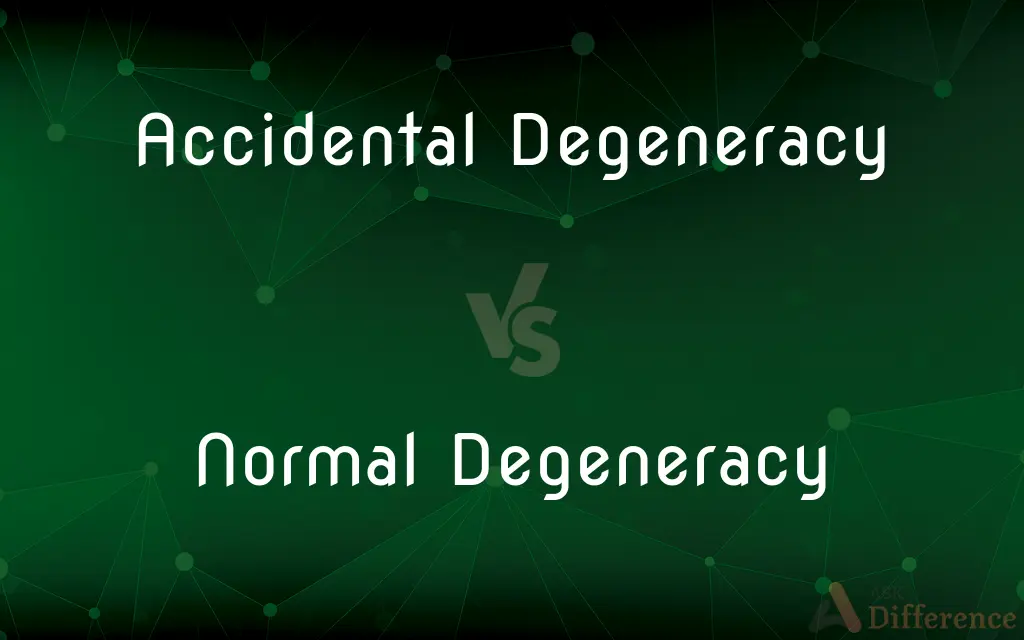Accidental Degeneracy vs. Normal Degeneracy — What's the Difference?
By Tayyaba Rehman — Published on November 22, 2023
Accidental Degeneracy arises unexpectedly in a system, not due to inherent symmetries; Normal Degeneracy is due to inherent symmetries in a system's quantum mechanics.

Difference Between Accidental Degeneracy and Normal Degeneracy
Table of Contents
ADVERTISEMENT
Key Differences
Accidental Degeneracy and Normal Degeneracy are terms rooted in quantum mechanics, referring to states that have the same energy.
Accidental Degeneracy pertains to the degeneracy that isn't a consequence of any symmetry in the system. It appears unexpectedly, and typically, perturbations or small changes can lift this kind of degeneracy.
On the contrary, Normal Degeneracy arises due to intrinsic symmetries in the quantum mechanical system. This type of degeneracy is more robust and doesn't easily break down with small perturbations or changes.
Therefore, while both Accidental Degeneracy and Normal Degeneracy relate to states having identical energy, their origins and stability differ.
Comparison Chart
Origin
Not due to system's symmetries.
Due to inherent symmetries in the system.
ADVERTISEMENT
Response to Change
Can be lifted by perturbations or small changes.
Remains stable against small perturbations.
Nature
Unplanned, unexpected.
Predictable, due to system's structure.
Typical Systems
Found in systems with no clear symmetry causing the overlap.
Systems with intrinsic symmetries.
Stability
Less stable.
More stable.
Compare with Definitions
Accidental Degeneracy
A quantum state overlap not due to symmetry.
In certain systems, accidental degeneracy occurs without any apparent reason.
Normal Degeneracy
A quantum state overlap due to system's symmetries.
The atomic structure led to a normal degeneracy in its energy levels.
Accidental Degeneracy
A rare event in quantum mechanics without clear causation.
Detecting accidental degeneracy requires meticulous observation.
Normal Degeneracy
A fundamental aspect in certain quantum mechanical systems.
Quantum mechanics students learn about normal degeneracy early on.
Accidental Degeneracy
An unplanned coincidence of states with equal energy.
The molecule exhibited accidental degeneracy, puzzling the scientists.
Normal Degeneracy
Inherent degeneracy due to the system's quantum mechanics.
The electron orbits in the atom showed normal degeneracy.
Accidental Degeneracy
Quantum overlap that can be altered by small changes.
A slight perturbation in the system removed the accidental degeneracy.
Normal Degeneracy
Degeneracy that's consistent and stable.
Despite external changes, the normal degeneracy remained unaffected.
Accidental Degeneracy
Degeneracy that's not inherent to the system's structure.
The unexpected overlap in energy levels was deemed an accidental degeneracy.
Normal Degeneracy
Predictable energy state overlap in specific systems.
Based on the system's symmetry, one can anticipate its normal degeneracy.
Common Curiosities
Is normal degeneracy more common than accidental degeneracy?
Yes, normal degeneracy, being due to inherent symmetries, is often more predictable and common in quantum systems.
Can external factors remove accidental degeneracy?
Yes, small perturbations or changes can often lift accidental degeneracy.
In which fields are these terms typically used?
Both terms are predominantly used in quantum mechanics and quantum physics.
Is normal degeneracy stable?
Yes, normal degeneracy, due to inherent symmetries, remains stable against minor perturbations.
Can we predict accidental degeneracy?
Generally, accidental degeneracy is unpredictable as it's not due to clear system symmetries.
What causes accidental degeneracy?
Accidental degeneracy arises without clear symmetries in the system, often unpredictably.
Can two different systems exhibit the same type of degeneracy?
Yes, different systems can both have accidental or normal degeneracies, depending on their properties.
Why is understanding these degeneracies important in quantum physics?
They provide insights into energy levels, system symmetries, and the behavior of quantum systems under changes.
Are there ways to prevent accidental degeneracy in a system?
Since it's unexpected and not due to clear causes, preventing accidental degeneracy is challenging.
Do these terms have applications outside quantum physics?
While rooted in quantum mechanics, similar concepts might appear in other fields, but with different implications and contexts.
Share Your Discovery

Previous Comparison
Super Retina vs. Liquid Retina
Next Comparison
Concave Polygons vs. Convex PolygonsAuthor Spotlight
Written by
Tayyaba RehmanTayyaba Rehman is a distinguished writer, currently serving as a primary contributor to askdifference.com. As a researcher in semantics and etymology, Tayyaba's passion for the complexity of languages and their distinctions has found a perfect home on the platform. Tayyaba delves into the intricacies of language, distinguishing between commonly confused words and phrases, thereby providing clarity for readers worldwide.













































